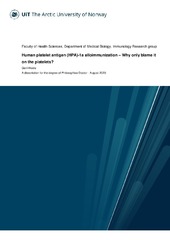Blar i forfatter "Heide, Gøril"
-
Anti-human platelet antigen (HPA)-1a antibodies may affect trophoblast functions crucial for placental development: A laboratory study using an in vitro model
Eksteen, Mariana; Heide, Gøril; Tiller, Heidi; Zhou, Yan; Nedberg, Nora Hersoug; Martinez-Zubiaurre, Inigo; Husebekk, Anne; Skogen, Bjørn Ragnar; Stuge, Tor Brynjar; Kjær, Mette (Journal article; Tidsskriftartikkel; Peer reviewed, 2017-04-21)Background: Fetal and neonatal alloimmune thrombocytopenia (FNAIT) is a bleeding disorder caused by maternal antibodies against paternal human platelet antigens (HPAs) on fetal platelets. Antibodies against HPA-1a are accountable for the majority of FNAIT cases. We have previously shown that high levels of maternal anti-HPA-1a antibodies are associated with clinically significant reduced birth ... -
Fetal exposure to maternal human platelet antigen-1a does not induce tolerance. An analytical observational study
Kjær, Mette; Tiller, Heidi; Heide, Gøril; Kjeldsen-Kragh, Jens; Skogen, Bjørn Ragnar; Husebekk, Anne (Journal article; Tidsskriftartikkel; Peer reviewed, 2017-08-24)Fetal and neonatal alloimmune thrombocytopenia (FNAIT) is a disease that may cause severe bleeding complications with risk of perinatal death or lifelong disability. The main cause of FNAIT is maternal antibodies against human platelet antigen (HPA)-1a. Both fetomaternal bleeding and transplacental trafficking of fetal cells during pregnancy could be the cause of alloimmunization. Persistence of ... -
Human platelet antigen (HPA)-1a alloimmunization - Why only blame it on the platelets?
Heide, Gøril (Doctoral thesis; Doktorgradsavhandling, 2021-01-15)Antibodies against human platelet antigen (HPA)-1a are the most common cause of fetal and neonatal alloimmune thrombocytopenia (FNAIT) in Caucasians, and is a break of the tolerance normally seen for the fetus in pregnant women. The initiation of immunization is suggested to be feto-maternal transfer of platelets during pregnancy and at delivery, and one of the consequences of anti-HPA-1a antibodies ... -
Isolering av villøse cytotrofoblaster fra humane, friske og fullgåtte placenta
Heide, Gøril (Master thesis; Mastergradsoppgave, 2011-09-15)Det er et paradoks at fosteret, som representerer fremmed vev, ikke avstøtes av morens immunsystem ved implantasjon. Stedsspesifikk suppresjon av den maternelle immunresponsen er foreslått som forklaring, og flere mekanismer for dette er kjent. Føtal og neonatal trombocytopeni (NAIT) er et av tilfellene hvor maternell immunisering kan føre til ødeleggelse av fosterets celler, i dette tilfellet ... -
The prevalence of HPA-1a alloimmunization and the potential risk of FNAIT depend on both the DRB3*01:01 allele and associated DR-DQ haplotypes
Ahlen, Maria Therese; Heide, Gøril; Husebekk, Anne; Skogen, Bjørn; Kjeldsen-Kragh, Jens; Stuge, Tor Brynjar (Journal article; Tidsskriftartikkel; Peer reviewed, 2020-04-16)Alloimmunization against human platelet antigen (HPA)-1a during pregnancy can cause foetal/neonatal alloimmune thrombocytopenia (FNAIT) and severe bleeding in the foetus or newborn and likely depends on several factors. HPA-1a alloimmunization is associated with <i>DRB3*01:01</i>, which is associated with several DR-DQ haplotypes. However, it is not known to what extent these haplotypes contribute ...


 English
English norsk
norsk



